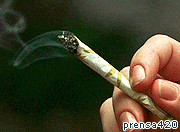A grieving father has told of how his son spiralled into mental illness having started smoking cannabis as a teenager.
Meanwhile two new studies, presented at the Royal Economic Society (RES) conference, have indicated the devastating consequences of weakening the law on drugs.
Former public school boy, James Herbert, 25, started smoking cannabis as a teenager and later took cocaine, ketamine, ecstasy, LSD and ‘legal highs’, his father told an inquest.
Died
Mr Herbert died after being detained by police under the Mental Health Act when he was reported as acting strangely on a road in Wells, Somerset in 2010.
Speaking about his son, Mr Herbert said: “With hindsight I am pretty sure that James’s mental illness had started in late 2005 possibly as a result of his cocaine use”.
Mr Herbert added, “James regretted the amount and frequency of his cannabis use when he was younger”.
Cannabis
One of the studies presented at the RES conference investigated the effects of a policy known as ‘The Lambeth Cannabis Warning Pilot Scheme’, which removed penalties for possessing cannabis in the London borough of Lambeth from July 2001 to July 2002.
The researchers from the Institute of Fiscal Studies and University College London said findings indicated an increase in the number of admissions to hospital for hard drugs.
Gateway
An RES press release said: “The increase in drug-related hospital admittances may lend support to the argument that cannabis acts as a ‘gateway’ drug to harder drugs.”
A separate study by researchers at Newcastle University said provisional findings suggest a relative increase, depending on social variables, in cannabis consumption after it was declassified.
In March last year a major study showed that cannabis use in teenage years can double the risk of mental illness in the next decade.
Psychotic
The study, carried out by a range of European scientists, followed the lives of nearly 2,000 young Germans over a ten-year period.
The research team focused on volunteers aged 14 to 24 none of whom had any history of psychotic symptoms.

